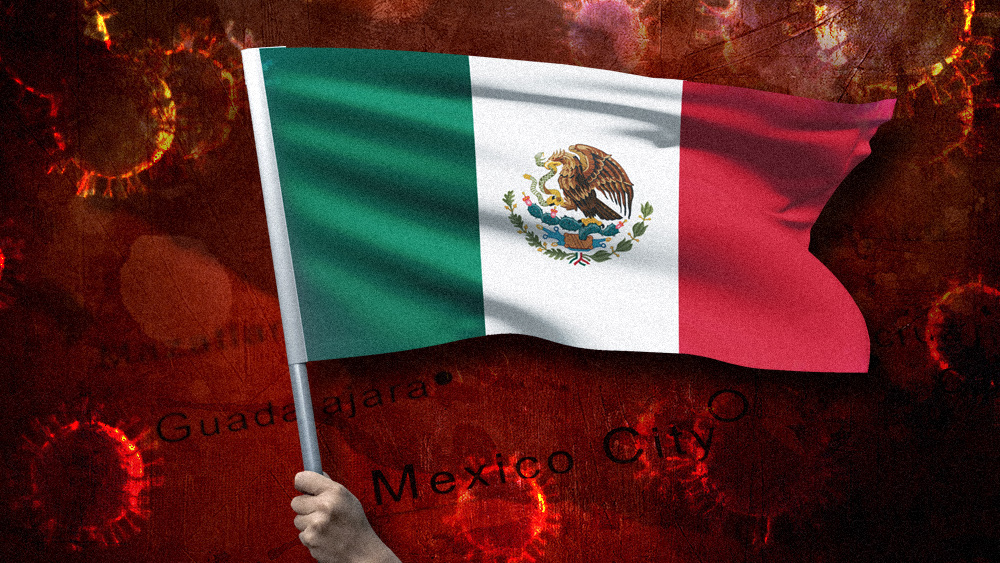Post-vaccine wave? Mexico City tightens lockdown after coronavirus cases surge
06/22/2021 / By Arsenio Toledo

Mexico City has strengthened its lockdown restrictions as the country’s capital deals with another outbreak of the Wuhan coronavirus (COVID-19). This outbreak is occurring even though the country’s mass vaccination drive is in full swing.
Many schools in Mexico City reopened at the beginning of the month and had gone back to in-person classes. These students returned to online instruction on Monday, June 21. The capital and its population of over nine million has also risen one tier higher in the country’s four-tier “traffic light” model of assessing coronavirus risk.
At the beginning of June, Mexico City health authorities loosened restrictions on gatherings in schools and other indoor locations such as retail stores, restaurants and hotels. This is when the city moved to the lowest risk tier.
But the Secretariat of Health, the federal health department, countermanded Mexico City’s loosening of restrictions and placed the city one step higher on the tier. This designation will last from June 21 to July 4, after which it shall be reassessed by federal health authorities.
Mexico City Mayor Claudia Sheinbaum said the city’s coronavirus cases surged, which is why federal health authorities decided to intervene.
Mexico ramps up mass vaccination, aided by vaccines donated by the U.S.
As of press time, Mexican health authorities have administered over 40 million doses of the coronavirus vaccine, or 31 vaccines for every 100 people. Around 22 percent of the population has received at least one dose of the vaccine. Thirteen percent of the population is fully vaccinated.
The United States is aiding Mexico’s mass vaccination campaign. On June 15, America donated 1.35 million doses of the single-dose Johnson & Johnson coronavirus vaccine to Mexico.
But there’s a catch. These vaccines can only be used to vaccinate residents of four cities: Tijuana, Reynosa, Mexicali and Ciudad Juarez. These are some of the largest Mexican cities that hug the border with the U.S. They have a combined population of around 4.7 million people.
The mass vaccination campaign using the American vaccines began the day after the vaccines arrived. The Johnson & Johnson vaccines will be provided to anybody over 18, even though Mexico’s own mass vaccination program is still focused on vaccinating people over 40.
In the same week that the American vaccines were distributed, reported cases surged by eight percent. Assistant Health Secretary Hugo Lopez-Gatell tried to justify the rise in cases by saying they were caused by surges in states far from the American border.
“There is a significant increase in case numbers,” said Lopez-Gatell.
The goal of focusing the donated vaccines in these border cities is to boost vaccination rates to levels similar to the American cities across the border that they adjoin.
Secretary of Foreign Affairs Marcelo Ebrard said that once the vaccines have been distributed, “there will be no public health arguments for keeping the border closed.” Lopez-Gatell said the country is seeking to acquire more vaccines for residents along the border. The country is even planning to vaccinate Central Americans who want to migrate into the U.S.
Baja California Health Secretary Alonso Oscar Perez said his agency plans to allocate certain days specifically for the vaccination of illegal immigrants. The border crossing in Tijuana is one of the busiest in the entire world. The entire state has thousands of migrants living in camps waiting for their turn to cross the border. (Related: Dozens of unaccompanied migrant minors sheltered in San Diego have tested positive for coronavirus.)
The plan to vaccinate migrants will begin in Baja California and then move east state-by-state until it reaches the state of Tamaulipas, the easternmost Mexican state that shares a border with the U.S.
Learn more about the mass vaccination campaigns in Mexico and other parts of the world by reading the latest articles at Vaccines.news.
Sources include:
Tagged Under: coronavirus, coronavirus vaccines, covid-19, infections, mass vaccination, Mexico, migrants, outbreak, pandemic, post-vaccine outbreak, superbugs, useless vaccines, vaccines
RECENT NEWS & ARTICLES
PharmaceuticalFraud.com is a fact-based public education website published by Pharmaceutical Fraud Features, LLC.
All content copyright © 2018 by Pharmaceutical Fraud Features, LLC.
Contact Us with Tips or Corrections
All trademarks, registered trademarks and servicemarks mentioned on this site are the property of their respective owners.





















